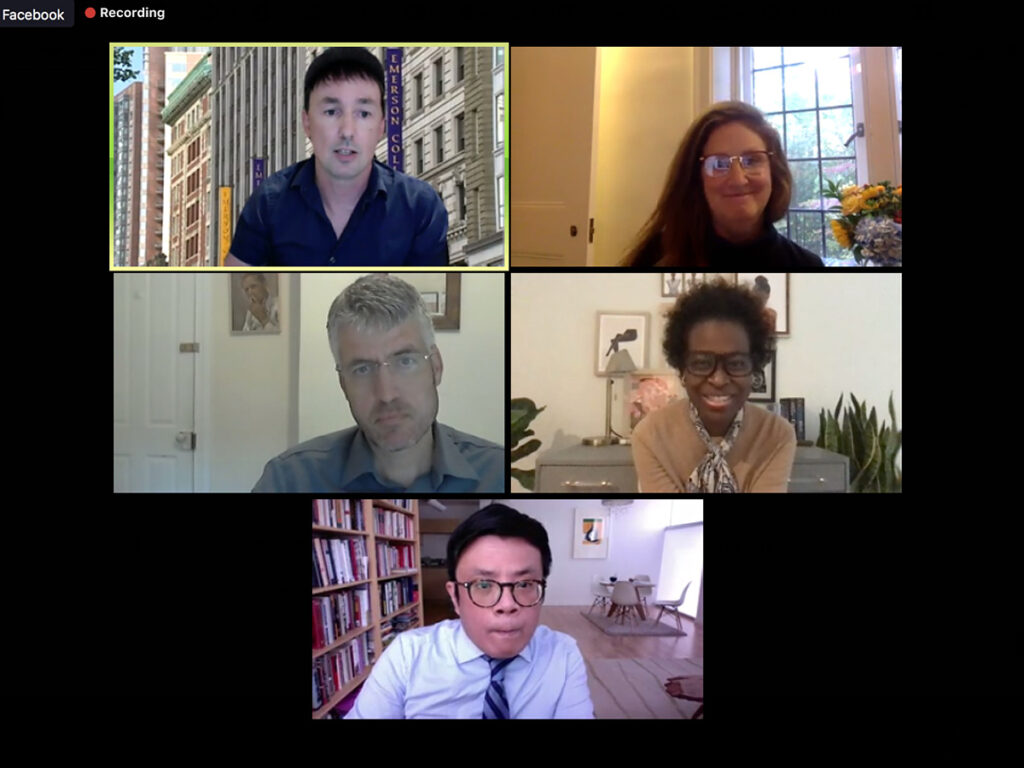WLP Panel: Better Coverage Needed of Those Most Affected by Issues

By Zenebou Sylla ‘22
Emerson’s Writing, Literature and Publishing (WLP) department brought together a panel of journalists and media makers earlier this month to talk about how the media should be covering the pandemic and the political landscape in this emotionally and politically charged election year.
Politics & Pandemic: Covering Our Strange, Polarized Times, was held via Zoom on October 5, and moderated by WLP Associate Professor Benoit Denizet-Lewis, a contributing writer for The New York Times Magazine. The discussion was free and open to the public.
Panelist Alec MacGillis, senior reporter for ProPublica, said the pandemic has only underscored racial inequities in the country, yet a number of glaring issues are not getting highlighted.
“It’s astonishing that we’re coming out of the summer of Black Lives Matter, rejuvenation of Black Lives Matter, and our tensions [over] of all these disparities,” MacGillis said, “And now we’re heading to [the] school year, last I checked, only one-quarter of Black children are actually getting to go to school and that’s mostly red states…and we’re not really talking about that, and I find that really remarkable.”
Los Angeles Times editorial page editor Sewell Chan said he has worked to ensure that his organization covers and portrays current events ethically and with intellectual honesty.
“I’m reminded by our readers every day that there’s a human face to this, that [the pandemic] isn’t just numbers,” Chan said. “I think this is a moment that cries out for expertise, that cries out for authority… I get frustrated when coverage of how terrible Trump is … takes the oxygen out of the room, and kind of almost intellectually numbs us.”
Olivia Nuzzi, New York magazine’s Washington correspondent and board member of Persuasion, which defends free speech and inquiry in liberal institutions, said that in her experience, angry pieces are popular with readers, but do little to advance the storytelling or illuminate reality.
“When I look at the pieces that I write or the podcasts that I do, that just get exponentially more traffic, it’s the pieces I’m most embarrassed about because I wrote them angry, and judgy, and overheated, and I just think that’s what’s everyone wants to consume,” Nuzzi said.
Instead, the media should focus on how people live, and those directly affected by the pandemic should be the forefront of how we write and what we write, said Errin Haines, editor-at-large of The 19th, a nonprofit and nonpartisan newsroom focused on the intersection of women, politics, and policy.
“Millions and millions and millions of people are being impacted by this pandemic, whether they ever get sick or not, whether they ever know anybody that gets sick or not, they are being impacted,” Haines said. “So [we should be] hearing from them about what their lived reality is … for the women who we know were masking up more this summer than men, who are doing most of the figuring out of caregiving, and in that same generation, where they are having to care for children and elderly loved ones.
“They’re looking at this and they’re pissed… thinking about [Trump] getting the best possible healthcare that so many people would never have the access of that kind of treatment that he got and they get sick through no faults of their own,” said Haines.
With the election getting closer, Haines points out that there needs to be more of a focus on the voters.
“Especially in the last 29 days now until the election, we know who Joe Biden is, we know who Donald Trump is, what we need to know is who the voters are and what they’re going to do, right? Because that is the variable here,” said Haines.
Categories